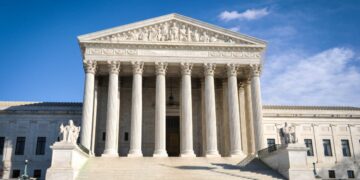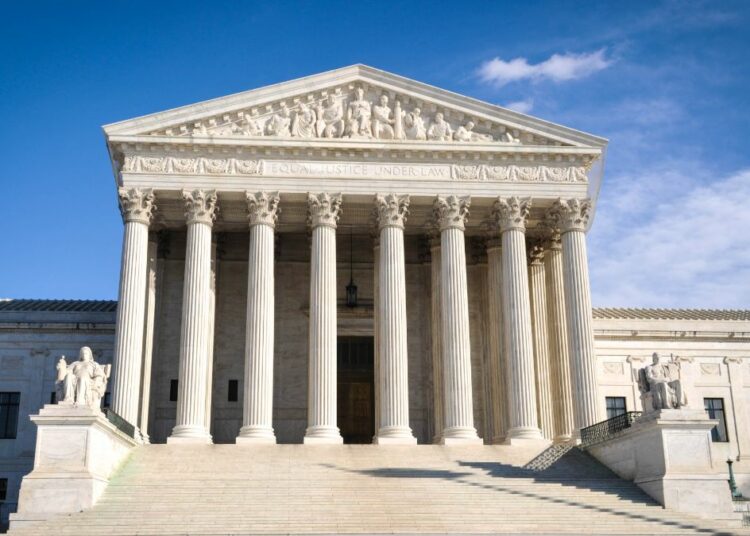Never had there been such a concentration of political genius as happened in Philadelphia during the summer of 1787. “If all the delegates named for this Convention at Philadelphia are present,” commented French Chargé d’affaires Louis-Guillaume Otto, “we will never have seen, even in Europe, an assembly more respectable for the talents, knowledge, disinterestedness, and patriotism of those who compose it.” Ardent students of the past, the delegates well knew that the liberty they sought to secure could be accomplished only by a separation of powers, as expressed by James Madison in Federalist No. 47:
The accumulation of all powers, legislative, executive, and judiciary, in the same hands, whether of one, a few, or many, and whether hereditary, self-appointed, or elective, may justly be pronounced the very definition of tyranny.
The enduring importance of Madison’s insight was brought home over two centuries later by Justice Antonin G. Scalia in his foreword for a 2008 symposium, Separation of Powers as a Safeguard of Federalism, in which he explained,
In the days when I taught constitutional law, the University of Chicago Law School had two constitutional courses. One was entitled Individual Rights and Liberties, and focused primarily upon the guarantees of the Bill of Rights. The other (I forget the title of it) focused upon the structural provisions of the Constitution, principally the separation of powers and federalism. That was the course I taught-and I used to refer to it as real constitutional law…. [I]t is a mistake to think that the Bill of Rights is the defining, or even the most important, feature of American democracy. Virtually all the countries of the world today have bills of rights. You would not feel your freedom secure in most of them… Consider, for example, the following sterling provisions of a modern bill of rights:
“Every citizen.., has the right to submit proposals to state bodies and public organisations for improving their activity, and to criticize shortcomings in their work…. Persecution for criticism is prohibited. Persons guilty of such persecution shall be called to account.”
“[C]itizens… are guaranteed freedom of speech, of the press, and of assembly, meetings, street processions and demonstrations. Exercise of these political freedoms is ensured by putting public buildings, streets, and squares at the disposal of the.., people and their organizations, by broad dissemination of information, and by the opportunity to use the press, television, and radio.”
“Citizens… are guaranteed freedom of conscience, that is, the right to profess or not to profess any religion, and to conduct religious worship, or atheistic propaganda. Incitement of hostility or hatred on religious grounds is prohibited.”
Wonderful stuff. These were provisions of the 1977 Constitution of the Union of Soviet Socialist Republics. They were not worth the paper they were printed on, as are the human rights guarantees of a large number of still-extant countries governed by Presidents-for-Life. They are what the Framers of our Constitution called “parchment guarantees,” because the real constitutions of those countries—the provisions that establish the institutions of government—do not prevent the centralization of power in one man or one party, thus enabling the guarantees to be ignored. Structure is everything.
The Founders further knew that separation of powers could never be maintained without an independent judiciary, as noted by Alexander Hamilton in Federalist No. 78: “The complete independence of the courts of justice is peculiarly essential in a limited Constitution.” No wonder Chief Justice William Rehnquist could declare that an independent judiciary is “the crown jewel of our system of government.”
One of the most dangerous potential threats to that crown jewel was addressed by Justice Ruth Bader Ginsburg in an NPR interview broadcast on July 24, 2019. By then, a number of congressional Democrats, disgruntled over President Trump’s appointment of two Justices (Ginsburg’s passing would soon open the way for a third), had discussed the idea of “packing” the Court by increasing the number of Justices if a Democrat won the presidency. When asked about that possibility, Ginsburg—a liberal who had opposed Scalia on many issues but saw eye-to-eye on the need to preserve separation of powers—responded, “Nine seems to be a good number. It’s been that way for a long time. I think it was a bad idea when President Franklin Roosevelt tried to pack the Court.”
And it would be bad now, she continued. “If anything would make the court look partisan, it would be that—one side saying, ‘When we’re in power, we’re going to enlarge the number of judges, so we would have more people who would vote the way we want them to.’” Doing so, she warned, would undermine public trust, upon which our judicial independence depends. “The court has no troops at its command, doesn’t have the power of the purse, and yet time and again, when the courts say something, people accept it.”
The same point would be made even more emphatically and at far greater length by Justice Stephen G. Breyer, the Court’s senior liberal member, speaking at Harvard Law School’s annual Scalia Lecture on April 6, 2021. “What I’m trying to do,” he explained, “is to make those whose initial instincts may favor important structural change or other similar institutional changes—such as forms of court-packing—think long and hard before they embody those changes in law…. It is wrong to think of the Court as another political institution. And it is doubly wrong to think of its members as junior-league politicians,” he said. “Structural alteration motivated by the perception of political influence can only feed that perception, further eroding that trust. There are no shortcuts to it.”
As summarized on the Harvard Law website, “Justice Breyer’s wide-ranging two-hour lecture, which was brimming with quotations from the likes of Cicero, Shakespeare, and Camus, and which cited more than 20 Supreme Court decisions spanning two centuries of American jurisprudence, was titled ‘The Authority of the Court and the Peril of Politics.’ In it, he traced the history of the judicial branch’s hard-won credibility since the nation’s founding, and implored would-be Supreme Court reformers… to confront how changes could impact one of the nation’s most trusted institutions.”
Just three days later, President Joe Biden took the first step down a road toward doing precisely what Justices Breyer and Ginsburg had warned against. By executive order on April 9, 2021, Biden created a commission to analyze “the principal arguments in the contemporary public debate for and against Supreme Court reform.” No one doubts that such “reform” refers to the very issue that candidate Biden refused to address in his first presidential debate. When repeatedly asked if he supported packing the Court, he finally responded, “I’m not going to answer the question.”
The clearer his answer now looms, the greater the need for all Americans to oppose it. “For all their historical errors and faults, courts are nevertheless indispensable institutions in our constitutional system,” says Princeton Professor Robert P. George, “and the independence of the judiciary is a sacrosanct principle. It is not that the number 9 is sacred or constitutionally required. It isn’t. But if the number of Justices on the Court is to be increased (or decreased), that decision must not be motivated and shaped by ideological goals. Even Roosevelt understood that well enough to realize he had to lie about the real purposes of his court-packing plan. The plan failed.”
Will the current plan fail? History has taught us, observed Ethiopia’s Haile Selassie, that “it has been the inaction of those who could have acted; the indifference of those who should have known better; the silence of the voice of justice when it mattered most; that has made it possible for evil to triumph.” We must not be silent. At stake is that judicial independence which is the crown jewel of our constitutional system so brilliantly designed to prevent tyranny and preserve our liberty.




















Discussion about this post